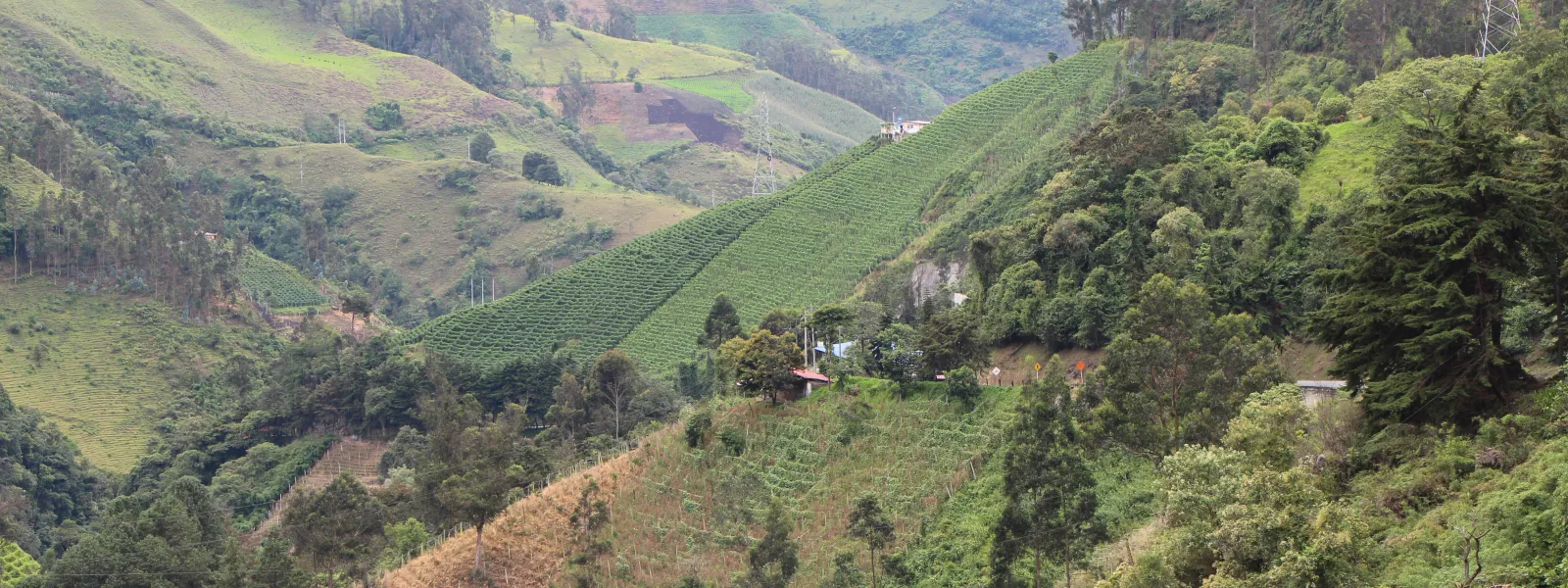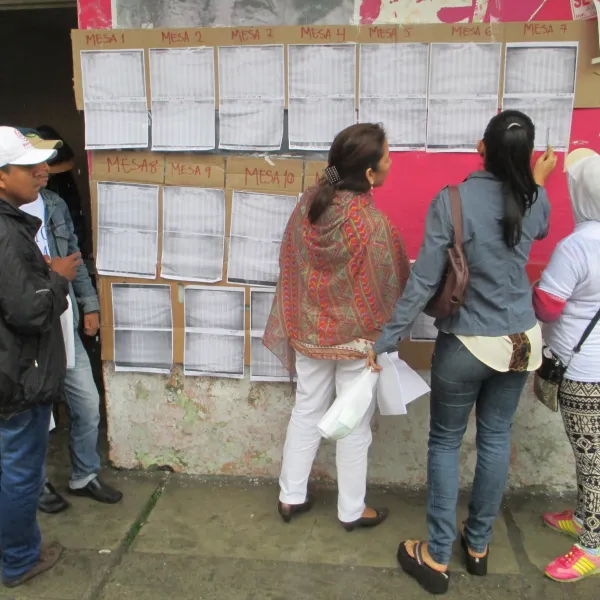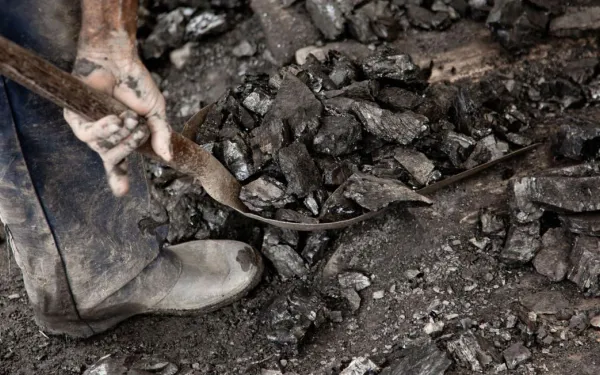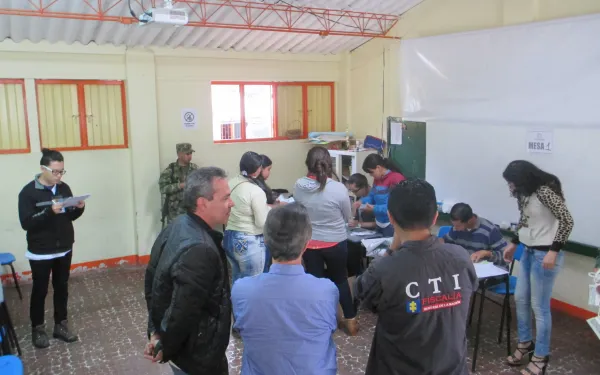
Project
Photo: Andrés Ángel / AIDASupporting Cajamarca’s fight to defend its territory from mining
Cajamarca is a town in the mountains of central Colombia, often referred to as "Colombia’s pantry” due to its great agricultural production. In addition to fertile lands, fed by rivers and 161 freshwater springs, the municipality features panoramic views of gorges and cloud forests. The main economic activities of its population—agriculture and tourism—depend on the health of these natural environments.
The fertile lands of Cajamarca are also rich in minerals, for which AngloGold Ashanti has descended on the region. The international mining conglomerate seeks to develop one of the world’s largest open-pit gold mines in the area. Open-pit mining is particularly damaging to the environment as extracting the metal involves razing green areas and generating huge amounts of potentially toxic waste
The project, appropriately named La Colosa, would be the second largest of its kind in Latin America and the first open-pit gold mine in Colombia. The toxic elements that an operation of that magnitude would leave behind could contaminate the soil, air, rivers and groundwater.
In addition, storms, earthquakes, or simple design errors could easily cause the dams storing the toxic mining waste to rupture. The collapse of similar tailings dams in Peru and Brazil in recent years has caused catastrophic social and environmental consequences.
On March 26, 2017, in a popular referendum, 98 percent of the voters of Cajamarca said “No” to mining in their territory, effectively rejecting the La Colosa project. AIDA is proud to have contributed to that initiative. But even with this promising citizen-led victory, much work remains.

Related projects
Latest News

What motivates us to preserve our freshwater sources?
The professionals of AIDA’s freshwater program defend one of Earth’s most precious resources—water. The earth provides us with water in many ways, and the ways those water sources are threatened are just as widespread—but chief among them are extractive activities like mining and fracking. At AIDA, we understand the risks and we won’t let our guard down. Learn more about what motivates us to care for our greatest life source! “WITHOUT WATER, THERE IS NO FUTURE.” Carlos Lozano Acosta, Senior Attorney “Water is a life force not just in nature, but in our societies as well. It is a distinct characteristic of our experience on the planet. Cultures, economies and ecosystems depend on water and, for that reason, there is no future for us on this planet without it.” As a child, Carlos and his family used go for hikes near his father’s farm, on the outskirts of a páramo—a unique high altitude wetland that captures moisture from the fog and sends water to lower elevations via streams. Since those early days, Carlos has understood that páramos are vital to the water supply in his native Colombia. “I GREW UP WITH THE IDEA THAT CLEAN WATER IS A RIGHT, NOT A PRIVILEGE.” Claudia Velarde, Legal Advisor “What motivates me to care for our water sources is life itself. Clean water is an indispensable resource, a common good and a basic human right; the reproduction of our life systems is not possible without it. I grew up with the idea that clean water is a right, not a privilege.” Claudia was born in Cochabamba, Bolivia, a city whose name in the indigenous Quechua language means “the plain of lakes.” Despite its name, the city has suffered from decades of drought and water scarcity. Cochabamba is infamous for the Water War of 2000, during which residents flooded the streets to defend their water from privatization. Claudia grew up in that context and, like many women from Cochabamba, she has a strong connection to water and its inherent value. “MY STRONGEST MOTIVATION IS AN AWARENESS THAT THE HEALTH OF EARTH’S ECOSYSTEMS DEPENDS ON FUNCTIONING WATER FLOWS.” Andres Angel, Scientific Advisor “My strongest motivation is an awareness that the health of Earth’s ecosystems depends in large part on functioning surface and subterranean water flows. Understanding that our economic activities have the potential to irreversibly disrupt those flows is to realize the urgent need to protect the sources and quality of water throughout the Americas.” It wasn’t easy for Andres to study geology, a career that often promotes extractivism. His principal motivation was to understand the conflicts and socio-ecological dangers caused by mining and fossil fuel exploitation in his country, Colombia. Understanding those impacts to be perpetual, Andres decided to devote his professional life to questioning the development model and providing alternatives. “TO PROTECT WATER IS TO DEFEND THE SOURCE AND MEANING OF LIFE.” Juana Hofman, Legal Coordinator for the Network for Environmental Justice in Colombia “Life is what motivates me. To protect freshwater ecosystems and the people that depend on them is to defend the source and meaning of life. I’m motivated by a deep respect for ecosystems, because I feel a part of them, and they need protection. I’m motivated by the frailejones, ancient plants that serve as water factories, and by the mountains, vast landscapes that have sheltered me since my birth. It is their strength and beauty that allow us to truly live.” Juana was born in a small town in the mountains of Colombia. When she was a child, her father taught her of the greatness of the oak trees, which for Juana came to signify strength and wisdom. Ever since, her life has been deeply linked to the mountains, rivers, and páramos of Colombia.
Read more
The Colombian town that’s taking on coal mining
“To leave for good is painful,” Flower Aria Rivera, 58, said with nostalgia. He doesn’t want to leave his land, his home. Doing so would mean leaving behind his identity, his story. Flower is from Boquerón, Colombia, a town of nearly 900 residents in the northwest department of Cesar. His ancestors, directly descended from Africans, were among the first inhabitants of his small town and many others in the region. They lived from raising cattle and growing rice. But that simple life is no more. The once-fertile soils of Boquerón have for more than 30 years been overtaken by large-scale coal mining operations. Since the corporations arrived, the town has been absorbed by coal and the many damages it leaves behind—like unhealthy levels of air pollution, and the depletion of water from rivers and other natural sources. The contamination had gotten so bad that, in 2010, the government ordered the mining company to relocate Boquerón’s residents. Eight years later, and that still hasn’t happened. On the contrary, new families have been arriving to Boquerón in search of the compensation that will surely be distributed when relocation finally does occur. “We want the mines to move, we want them to stop polluting our town,” said Flower, one of the most respected of the community, which has peacefully resisted despite the outbreak of skin and respiratory diseases. Flower is not a conventional leader. He speaks softly, while smiling. His deep black skin contrasts with his pure white hair. He’s sweet and calm and, above all, full of faith and hope. I met him two months ago when he participated with other leaders in a public forum co-organized by AIDA, Tierra Digna, CENSAT Agua Viva, University of Magdalena, the Environmental Justice Network of Colombia, and the Rosa Luxembourg Foundation. There, participants discussed what’s needed to enable Colombia to move its economy away from coal exploitation and toward alternative energies—those that respect the both climate and communities. “Coal has left us with nothing, only sadness,” Flower lamented. Colombia is the fourth largest coal exporter in the world. As such, the government has the ethical and moral obligation to reduce its carbon emissions, which have contributed to exacerbating the climate crisis. At AIDA, we believe in a clean energy future, and our work will continue to support the move towards a coal-free Latin America. To close, I’d like to share a poem Flower wrote. In it, he expresses longing and love for his land, and his fear of the “damned black stone.” A mi Boquerón Boquerón del alma mía Terruño de mis entrañas Estoy perdiendo mi alegría Mis costumbres y mis esperanzas Camino lento y con tristeza Con solo pensar en tu partida Historia mía, historia tuya Es como un llanto en noche buena Quisiera morirme en tus recuerdos Donde viví muchas nostalgias De amores y vivencias de este mundo Cómo te llevo Boquerón en el alma Voces de recuerdos se escuchan a lo lejos De un niño y un viejo Como añorando el pasado De Boquerón y sus hermosos tiempos Partir sin regreso es doloroso Y un diciembre sin ti es morir Como regresar después a pajuil Cuando mis zapatos se han roto Ya inerme camina un boqueronero Y la historia del tucuy, el manantial y la lomita está muriendo Hoy hasta el mismo cielo está llorando En gotas de agua convertidas en desespero Quisiera regresar a las faldas de mi madre Como cuando niño me escondía debajo de ella Escucho a lo lejos la voz del patriarca Rivera Ángel Que desde su tumba como deseando una esperanza Adiós diablito caño, palma y paralú donde di mi grito de libertad y olvidé mi esclavitud de mi raza palenquera y también de chambacú y olvidé por mis ancestros lo juro por ese cielo azul Maldita piedra negra Que hizo cambiar mi historia Un humilde pueblo llora La funesta partida de toda una vida
Read more
Victory in Colombia: Citizens Vote to Ban Mining in their Territory
On March 26, 2017, 98% of voters in Cajamarca, Colombia decisively rejected mining in their territory. The results of the referendum (or “popular consultation”) are binding under Colombian law. Now municipal authorities must issue regulations to implement the ban. AIDA was part of the legal team that advised the Cajamarca community and developed a strategy, including the referendum, to stop a proposed mine that threatens to pollute the water supply. AngloGold Ashanti was in the exploration phase of a project called La Colosa (the Collosus)—aptly named, because it would be among the world’s 10 largest open-pit gold mines, the second-largest in Latin America. In a country coming out of a 50-year civil war, the referendum is a victory not only for the environment, but also for democracy. Banning mining through popular consultation demonstrates a commitment to solving environmental conflicts in a peaceful and participatory manner. It also allows citizens to exercise their human right to have a voice in public issues that affect them—a key element of true democracy—and to safeguard their human right to a healthy environment.
Read more